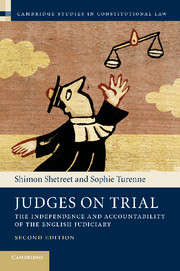Book contents
- Frontmatter
- Contents
- Foreword
- Acknowledgments
- Table of cases
- Table of legislation
- List of Abbreviations
- 1 Introduction
- 2 Constitutional steps towards judicial independence
- 3 The structure and governance of the English judiciary
- 4 Judicial appointments
- 5 Standards of conduct on the bench
- 6 Standards of conduct in extra-judicial activities
- 7 Immunity, discipline and removal of judges
- 8 Freedom of expression and public confidence in the judiciary
- 9 Conclusions
- Annex 1 Courts and tribunals structure
- Index
- References
2 - Constitutional steps towards judicial independence
Published online by Cambridge University Press: 05 June 2014
- Frontmatter
- Contents
- Foreword
- Acknowledgments
- Table of cases
- Table of legislation
- List of Abbreviations
- 1 Introduction
- 2 Constitutional steps towards judicial independence
- 3 The structure and governance of the English judiciary
- 4 Judicial appointments
- 5 Standards of conduct on the bench
- 6 Standards of conduct in extra-judicial activities
- 7 Immunity, discipline and removal of judges
- 8 Freedom of expression and public confidence in the judiciary
- 9 Conclusions
- Annex 1 Courts and tribunals structure
- Index
- References
Summary
Introduction
2.1 The history of judicial independence has been well documented by Robert Stevens. With the purpose of setting the constitutional background to this work, we sketch, over the centuries, the position of the judiciary in relation to the executive and Parliament, before considering the further step towards judicial independence under the Constitutional Reform Act 2005 (CRA) and the consequences of the Human Rights Act 1998 (HRA). A sense of the existing strains allows us to understand better the concern that the Lord Chancellor’s duty to preserve the independence of the judiciary should be put on statutory footing in the CRA.
History
2.2 Our brief historical account focuses upon the emergence of the foundations of the modern judiciary in the events of the seventeenth century. In the sixteenth and seventeenth centuries, judges were an integral part of the royal administration and, at the direction of the Crown, performed many administrative duties. To Tudor and early Stuart men the distinction between judicial and administrative duties would have been rather obscure. Holdsworth’s observation that the Chancery was ‘a branch of the civil service as well as a judicial court’ applied in varying degrees to many institutions that we now refer to as ‘courts of law’. As long as the King and Parliament did not come into conflict and did not look to the courts of law for support in the struggle for power, the independence of the judges was not an important issue. Thus, under the Tudors, the issue of judicial independence did not give rise to difficulties. During this period the judges undoubtedly were not independent: they were under strict royal control and the Crown enjoyed their cooperation. Since judges were not sought by the sovereign of the day to be instruments in political struggles, this harmonious cooperation met with popular approval. Similarly, because judges were outside the sphere of politics, very few were removed for political reasons during this period, even though they held office at the King’s (or Queen’s) pleasure.
- Type
- Chapter
- Information
- Judges on TrialThe Independence and Accountability of the English Judiciary, pp. 21 - 46Publisher: Cambridge University PressPrint publication year: 2013



